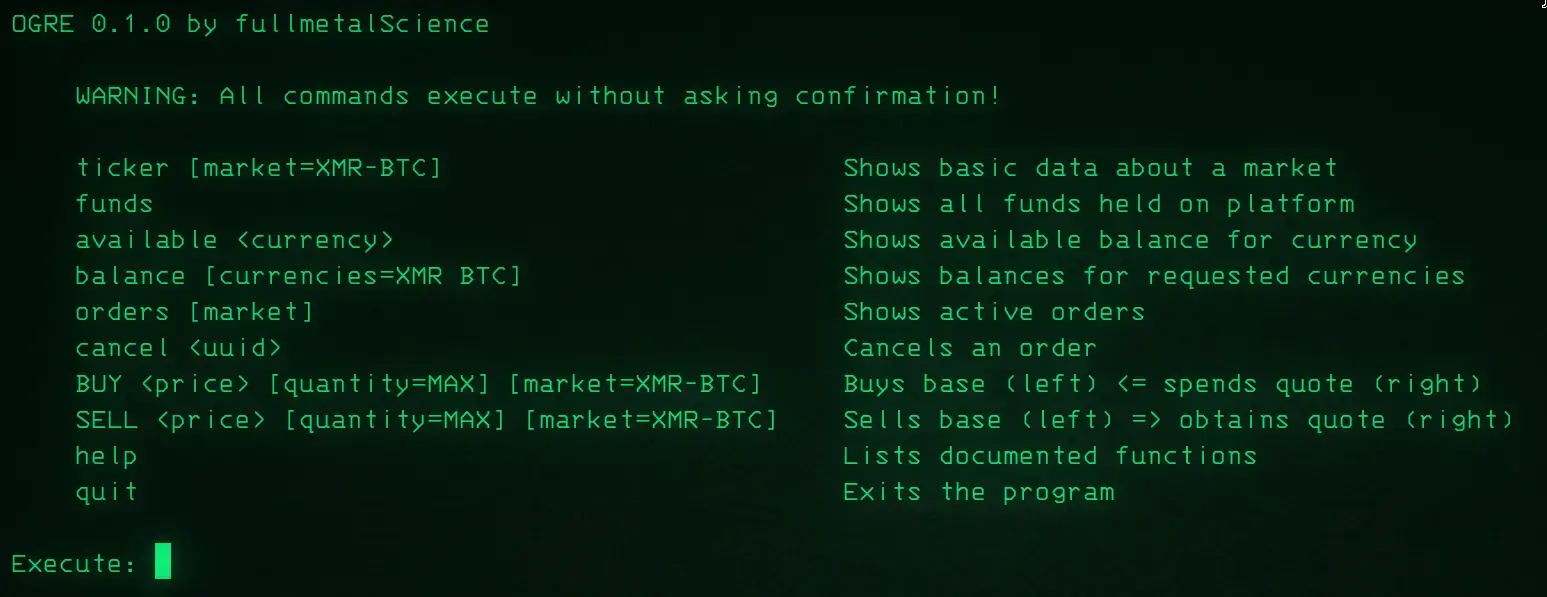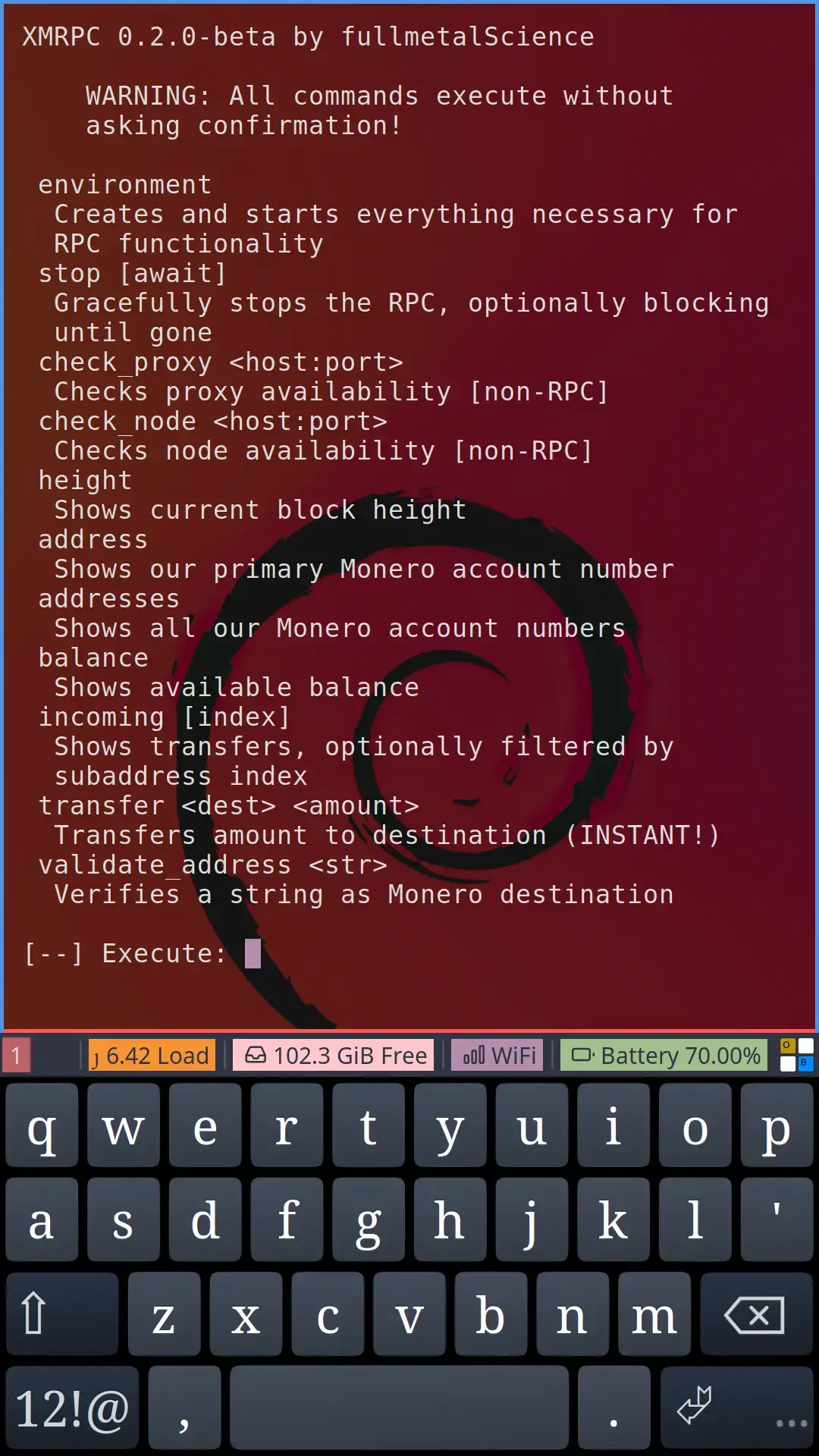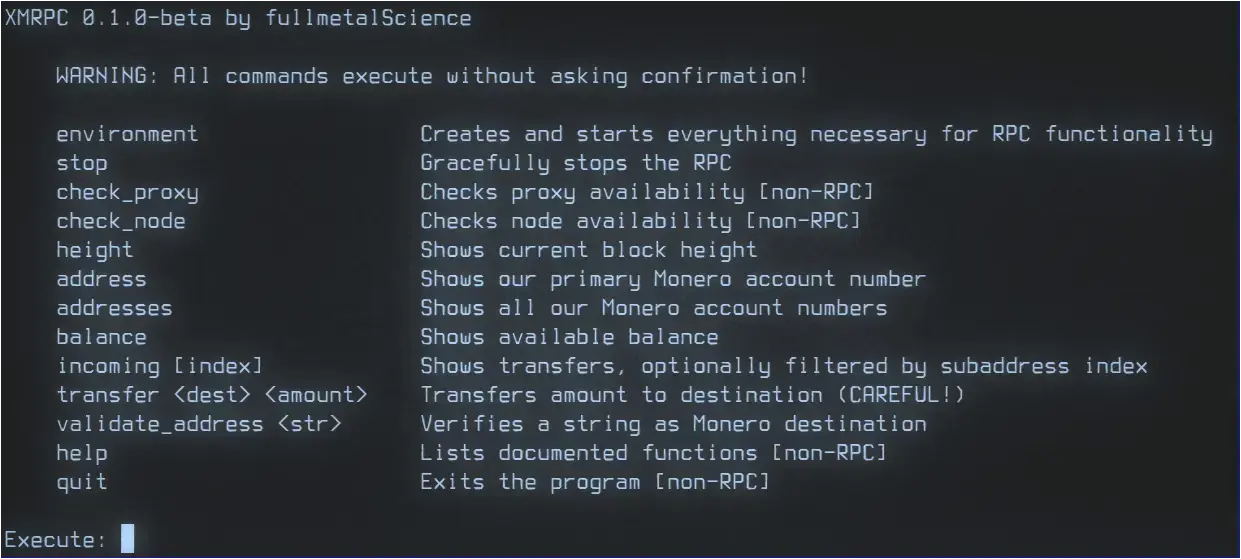
GitLab Enterprise Edition

NoShore: Groundwork for on-the-go offline payments

GitLab Enterprise Edition

For years, I've been unable to let go of the vision of creating the simplest payment-interface possible.
I couldn't find the required specialists to outsource some challenging parts of my initial design.
Now, thanks to a discussion with the developer of XmrSigner - plus the interest of someone specialized in FPGA's, I realized that I could create a major part of the functionality and, from there, follow a clear path forward.
Please feel free to review the linked CCS-draft - any workable feedback is welcome!
This sure clarifies the circumstances. I appreciate the explanation and went on to verify the claims.
Here are the corresponding Etherscan-links to spare others the hassle:
So far I couldn't detect any discrepancies. Note that, on Blockchair, whale.monerochan.eth appears to resolve to 0x0000000000000000000000000000000000000000, while airdrops come from 0x4642, after being funded by 0xB9A1.
Thank you for the onboarding!
The text has some ... "orange" flags.
For example, burning 25% doesn't make sense when you decided on the supply to begin with and "100 % fair distribution" isn't possible in the given scenario.
But then again, meme coins are all about not making sense, and some play may actually lead to the desired exposure. Let's get Monero some marketing:
0xe746433469235aB0D5cc404b592C9634eF2ECB1D
It does make sense that the tables are for Monero-exclusive applications. Loaded GUI's lead to user confusion and thus errors.
Think absolute beginner: "I installed that secure app you recommended and bought <thatothercoin>
According to my recent test, the premium was 4.7 percent compared to spot rates, hence their pricing is not competitive and Bitrefill remains without a serious contestant. There you'd only pay the ~0.5% fee for going through an instant exchange in order to have your XMR arrive as BTC.
EDIT: Now, a day later, I did another test and got percentages from 1.8 - 2.0 % which is much more reasonable.
Hint: To quickly get the hidden fees of any purchase, execute units like this: ./units.sh '<xmr-cost-at-checkout> XMR' '<EUR|USD|...>' or ./units.sh '<xmr-cost-at-checkout> XMR / <value-in-fiat> <EUR|USD|...>' '%' for the total percentage asked.
Adding the image seems to have removed the original URL ... while maintaining the link's description. I suspect a bug (@admin?).
In any case, I've added an explicit link at the end of the original post.
For those seeking to trade more efficiently on the platform, I just published a tool for updating TradeOgre-orders from the command line: Terminal-Interface to TradeOgre
New tool: Terminal-Interface to TradeOgre


A couple of months ago, rumors about TradeOgre blocking withdrawals for an unrelated crypto asset circulated.
I began avoiding the exchange, but when the other day a user urged to trade on the platform, I decided to publish this tool regardless. It might prove useful to some people in the community.
OGRE is a terminal interface, both console and CLI, optimized for swing-trading XMR<->BTC on TradeOgre.
It is similar in use to XMRPC, but instead of managing your Monero RPC, you manage your orders on said platform.
Please refer to the corresponding section on xmr.zone.

We gather and conserve valuable thoughts extracted from various types of media. As soon as we feel like it, we present them here in condensed form. Quotes are neither an endorsement nor an objection to the person quoted, their endeavors or associated parties.

Curiously, most ended up preferring a less readable XMR ID, leaving many common and given names available.
Maybe this is because nowadays we tend to assume the good ones online to be taken - so it's actually a great idea that you point that out! Let's see how it affects the trend.
It's a command-line interface that allows you to do "anything Monero". You will find details in the linked resources and can get a better idea by looking at the screenshots.
more aliases are available to register
This one is technically not true until you add Punycode support - and only if you manage to remain below XMR.ID's user count by that time :D
(Without Punycode, staying RFC-compliant, and applying XMR.IST's restriction of 30-characters max, we could provide roughly a count of 30^37-1-<amount of users>, but even if we had a 10-chars limit, the number would still be unfathomable.)
Welcome to the space - it feels less lonely now!
XMRPC v0.2.0-beta released


A new version of XMRPC - the alternative Monero CLI has been tagged.
As will be held commonplace with XMRPC, every important aspect is tweakable through environment variables.
By default, it does what it can to get new users set (using maximum privacy available). As they advance, they may employ options to confine XMRPC to select preferences.
For more details refer to the documentation or download the new version 0.2.0-beta directly:
If you haven't previously cloned XMRPC
undefined
git clone --branch v0.2.0-beta \
https://gitlab.com/fullmetalScience/sxmo-onfire.git
If you are working with an existing clone
undefined
git fetch origin tag v0.2.0-beta
git checkout tags/v0.2.0-beta
Your feedback and questions are welcome!
*You may also be
In personal discussions, people of such credentials confirmed that they also just "trust the [academic] process" and "don't have time" to check the foundations of their convictions. And that they didn't know, but "there surely was someone specialized" who does.
More clearly, in this context, saying you trust your mate is equal to saying you trust your recorder that is replaying the cassette that someone happened to have left in it.
Personally, when I opened the link yesterday, I wondered if I was looking at a product for 4-year olds: Big round shapes, bright colors, ... and nothing that would give me a clue about what I am actually looking at.
I might simply not be in it, but who's the target audience here?
An alternative Monero CLI


If you are anything like me, you much prefer a good CLI over clicking around in a GUI.
Now, with Monero it's never "fire up, issue transaction, exit".
Catching up on a week's worth of blocks can mean a long wait - especially if there are anonymity networks between you and the node.
If you decide to cope by leaving the CLI running, you find your tx-notes gone after a reboot. Less recent versions would even loose your sync level. Uff.
You could make it a habit to follow your set_tx_note up with a save, but that's not ideal.
To tackle the issue for myself, I've started to write XMRPC, a POSIX-compliant shell script that allows you to interact with monero-wallet-rpc.
This way you can have the RPC continuously syncing in the background and interact when necessary.
In fact, XMRPC takes care of launching the RPC and also creates a wallet if you happen to be starting from scratch.
The tool is aggressive in that it doesn'
Oh. XMR.ID is not an email service.
Names simply resolve to Monero destinations to simplify payments for the sender.
The two formats whatever@example.org and whatever.example.org were chosen by the designers of OpenAlias, the set of definitions XMR.ID builds upon.
The animations in the website's screenshots-section show XMR ID's in action.
Note that the email address requested at signup is used by the system to send further instructions.
Could you lay out the scenario you are contemplating?
Review of the XMR.ID stagenet test
The test for improved XMR ID sign-ups has concluded on stagenet and the form is now active for mainnet-registrations of "real" XMR ID's at https://xmr.id.
With this, the parts of the sign-up that do not require human interaction got a boost - while nothing has changed for active XMR ID's. The qualities of those are the same - regardless of when and how they were registered.
For those interested in the test's findings, here's a report for transparency.
If you'd rather be spared the details, feel free to head over to !xmrid@monero.town instead, where I publish tips and announce software aimed at making your Monero-life easier.
Three major issues were encountered and taken care of:
Our provider for the xmrid.com (secondary) domain experienced a partial service outage. For a couple of hours the DNS wouldn't return any responses to queries.
Our internal monitoring reported the error at around 11 p.
The current design appears to rely on fees.
As it currently stands, I suspect Haveno will be in the same situation as LM, legally.
This is heartbreaking news. LocalMonero enabled anyone capable of navigating Ebay to convert XMR.
Thank you, Alex & the team, for all those years of providing what is probably the best Monero-service of all.
Address reuse NOT being a problem in Monero is the reason this service can be provided in good faith.
Why is Monero address reuse not discouraged?
You can find further details in this Monero Stackexchange thread.
The time required depends on where you start. Someone who knows how to register a domain but has yet to read up on OpenAlias will probably need about an hour or two (if we do not take into account the hassles associated with DNSSEC with many registrars).
Then the cost of a privately registered domain starts at around 15 dollars per year, whereas the same is roughly the one-time price of a permanent XMR ID with two domains secured against each other (meaning that both, DUKETHORION.xmr.id and DUKETHORION.xmrid.com will return the same Monero destination). Wallets can opt to verify this.
Manipulation of any record would immediately trigger a notification to all affected users, leaving me with nothing but a destroyed reputation.
The most granular use I can think of is telling someone in-person to load your XMR ID on their device and then confirming what you see.
Coupled with a client that stores the result in a local address book - and compares it with the current DNS responses every time - even senders can be sure that they are still working with valid information.
(An extension to the official Monero client supporting this is in the works.)
It's from monero.graphics. It could use an extra dot, I agree :)
The theme resonated - especially in the context of OpenAliases - as I consider more personal and memorable Monero destinations an important factor in the context of building parallel economies, human to human, thus making Monero "greater" through use.
New XMR ID signup // Free stagenet alias!


As we ramp up to celebrate Monero's 10th birthday, here's an opportunity to get acquainted with Monero ID's - easy and free!
TL;DR: Fill out the form at get.xmr.id/form.html to get your very own stagenet OpenAlias.
OpenAlias is great: You hand someone a simple domain name and their Monero client resolves it to a destination. No copy-paste, no QR-code scanning - just ready to send!
To make your life easier, XMR.ID provides this as a service.
Previously, setting up your "XMR ID" required significant manual intervention, that delayed the process more than necessary.
After a broad set of optimizations, new aliases are now typically ready-to-use within 15 minutes.
The new automations repect XMR.ID's design goal of avoiding web-based self-service, thus maintaining the previous level of security.
Before enabling this new method in production, we will test in on *S
1000 USD bounty for Linux camera support offered in XMR
calling qualified developers